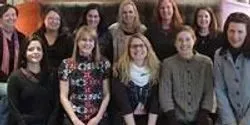women in STEM

The number of women across the globe filing patents with the U.S. Patent and Trade Office over the past 40 years has risen fastest within academia compared to all other sectors of the innovation economy, according to a new study from Indiana University.

The stereotype that women lack natural "brilliance" could explain their underrepresentation in academia, according to new research based at Princeton University.

Over 300 women scientists, engineers, educators, and other professionals attended the second annual Inspiring Women in STEM (science, technology, engineering, and math) Conference in October. Talent management consultant Mary Schaefer offered a speech called “GPS Your Career: Tools and Tips to Get You Where You Want to Go.”

Tracey Holloway was a postdoctoral researcher at Columbia University in 2002, Ph.D. from Princeton University freshly in hand, when she and five colleagues teamed up to create an informal support network for other women in their field.

The University of Illinois at Chicago is one of 15 universities joining an initiative to increase the percentage of women and minorities pursuing undergraduate degrees in computer science. UIC and each of the other universities will receive $30,000 a year for three years to support their efforts.

The number of women being trained to enter engineering, science and social science academic careers is not the cause of female underrepresentation in those fields, attendees at a University of Virginia seminar on faculty hiring learned last week.













